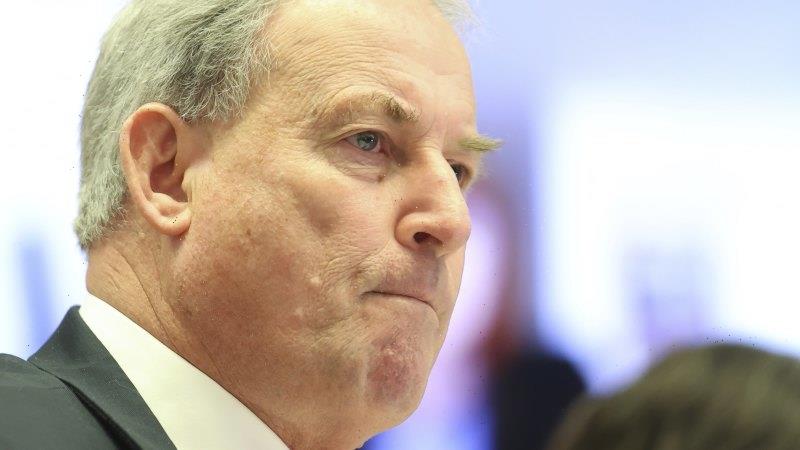For our free coronavirus pandemic coverage, learn more here.
The disability sector has slammed the slow rollout of COVID-19 vaccinations amid revelations that fewer than 2 per cent of people living in disability residential accommodation have been fully vaccinated.
Health Department officials told Senate estimates on Tuesday about 355 people – or 1.6 per cent – of the 22,285 people living in disability accommodation had received both doses of the vaccine.
Aged Care Services Minister Richard Colbeck at Senate estimates today.Credit:Alex Ellinghausen
About 3500 residents have had either one or both doses.
Asked whether he was comfortable with the “incredibly low” number of fully vaccinated people, Aged Care Services Minister Richard Colbeck said: “We continue to prioritise the work as quickly as we can to get the rollout completed.”
Australia’s 6000 disability homes were to be among the first to receive vaccinations under phase 1a of the plan released by Health Minister Greg Hunt in January.
However, the Disability Royal Commission this month heard the government had decided to focus on completing vaccinations for aged care residents first, given 685 people had died of COVID-19 in aged care, compared with nine people who were National Disability Insurance Scheme participants.
“We were pretty furious when we learnt that the federal government had pivoted to focus on prioritising aged care and away from disability without any consultation,” said David Moody, chief executive of peak body National Disability Services.
“We know from all the research that people with a disability have a greater likelihood of having a very negative outcome when they contract the disease, possibly serious illness or even death.”
Mr Moody welcomed the Victorian government’s decision to fast-track jabs for disability and aged care workers at mass vaccination centres from Wednesday. But he said the federal government needed to mandate the vaccine for disability support workers providing face-to-face support.
“This [position] was established by National Disability Services in response to the incidence of disability support workers indicating that if offered the vaccine voluntarily they would not be taking it,” Mr Moody said. “That’s a concern for our members who are committed to providing safe services for people with a disability.”
Able Australia CEO Kate MacRae.Credit:Simon Schluter
Kate MacRae, the chief executive of Able Australia, which operates 55 residential disability homes nationally, said vaccinations for residents had occurred at just two of its homes. She said she was contacted by Aspen Medical – one of the private contractors the federal government hired to distribute the vaccine – on May 19.
Aspen Medical scheduled vaccinations at homes in Victoria on May 26 and 27 and then cancelled at the last minute without giving a reason, Ms MacRae said.
They were finally carried out at two homes last Friday, the first day of Melbourne’s lockdown.
“Up to that point, of the 55, we had had no homes vaccinated at all,” Ms MacRae said.
She said the concerning issue was that there was no communication of the implementation plan for the rollout in disability residential homes, which housed very vulnerable people.
“Today I’ve written to a family who are really distressed because they are wondering, why hasn’t their adult daughter had her vaccine? In any crisis situation – and we’ve been in a crisis situation now for 16 months – the most important thing is knowing what your implementation plan is so that you can work towards it,” Ms MacRae said.
“For us to be told that we’re getting vaccinations to our homes the following week and then be cancelled on the day and cancelled the next day and then turn up on the third doesn’t speak to a plan to me. And this week we have phoned every day. One day we phoned Aspen Medical 17 times to ask them what the plan is and you just go to an answer service.”
An Aspen Medical spokesperson said the group had been required to reallocate resources to the aged care vaccination program.
“As a consequence, and regrettably, there were a small number of cancellations within the disability care sector to facilitate this. We will closely work with disability care providers and the other organisations involved in the vaccination rollout to ensure it is completed as soon as possible.”
Wallara chief executive Phil Hayes-Brown said residents at just three of his group’s eight disability residential homes in Victoria had been vaccinated and even then only in the past couple of weeks.
“The whole way through from the PPE [personal protective equipment] scramble, when COVID first started, to now the scramble for vaccination, it feels like the disability sector keeps shouting out, ‘Hey, we’re in the same risk category, hello, hello, don’t forget us,’ ” he said.
Mr Hayes-Brown also backed the push to mandate vaccinations for disability support workers.
“We were disappointed when the government didn’t go there,” he said. “There is hesitancy out there with some staff who feel like it’s been rushed or are unsure about it – that was about 30 per cent of our staff. But we need to protect vulnerable people and it should be no jab, no work.”
Labor’s federal NDIS spokesman Bill Shorten said it was not good enough that only 355 people living in residential disability care had been vaccinated.
“This is a very real crisis for all Australians, not just for Victoria,” he said.
The Morning Edition newsletter is our guide to the day’s most important and interesting stories, analysis and insights. Sign up here.
Most Viewed in National
From our partners
Source: Read Full Article


